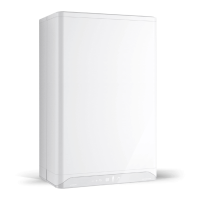15
USER’S INFORMATION MANUAL
SFT SERIES WATER HEATERS
Relief Valve - Maintenance and Testing
The eld-supplied relief valve manufacturer requires that under normal operating
conditions a “try lever test” must be performed every two months. Under severe
service conditions, or if corrosion and/or deposits are noticed within the valve
body, you must test more often. Also perform a “try lever test” at the end of any
non-service period.
Test at or near maximum operating pressure by holding the test lever fully open
for at least 5 seconds to ush the valve seat free of sediment and debris. Then
release the lever and permit the valve to snap shut.
If the lever does not activate, or there is no evidence of discharge, discontinue
use of equipment immediately, and contact a licensed contractor or qualied
service personnel.
If the relief valve does not completely seal, and uid continues to leak from
the discharge pipe, perform the test again to try and ush any debris that may
be lodged in the valve. If repeated attempts fail to stop the leakage, contact a
licensed contractor or qualied service personnel to replace the valve.
Domestic Hot Water System
Quality of the domestic cold water is very important to the longevity of the unit.
The recommended pH of the domestic water is between 6.5 and 8.5. The internal
domestic water heat exchanger tubing and the ow sensor is subject to fouling if
exposed to hard water (over 7 grains of hardness) or has a TDS of 500mg/L or
higher. See Table 3.
DESCRIPTION MAX MIN
Water Pressure 150 psi 40 psi
Programmable water temperature 149°F (65°C) 104°F (40°C)
Minimum Flow Rate to Activate DHW Sensor N/A 0.5 GPM
Acceptable pH range 8.5 pH 6.5 pH
Chloride 250 mg/L
Iron 0.3mg/L
Total Dissolved Solids 500mg/L
Total Hardness 7 grains
Table 3: Domestic Water Quality Guidelines
CAUTION
Before testing the relief valve,
make certain the discharge
pipe is properly connected to
the valve outlet and arranged
to contain and safely dispose
of equipment discharge.

